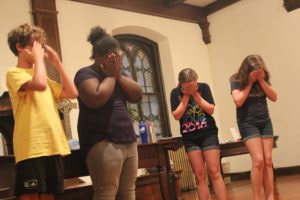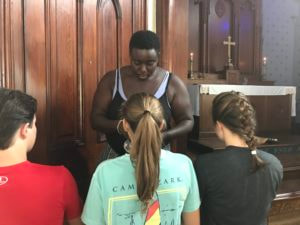|
For the last two weeks we’ve been discussing how we can “mission our worship,” meaning how we can take the elements of our worship service and translate them to mission related activities. We started out talking about mission as a way to live out the command to “love our neighbor.” We discussed the first element of our worship services, the Call to Worship, as a call coming from God to us as God’s people We respond to that call through the rest of our worship service. Likewise, God keeps calling us in other times throughout the week to engage in things that can help our neighbors; be that prayer, sharing resources with those in need, or sharing our time and talents to help others. The next week we discussed the Adoration part of worship. Typically this is a song or prayer highlighting the glory of who God is and what God has done. We discussed how we can give adoration to God the Creator by honoring and caring for God’s creation. This could look like participating in a river clean up or doing other ecology related projects. For other ideas, visit your denomination’s resources for caring for creation!
time of confession is not just about our own personal sins (i.e, everything I did wrong this week). This time is also a time to recognize the collective sin of the community, even of the country and the world. Sometimes our sin is not just in our actively doing something against God’s expectations, but also in our apathy and passivity in regards to the struggles of others. So how can we “mission” this part of worship? Well, if confession is about acknowledgement of sin, then we can mission this by educating ourselves in the ways that we have collectively failed to do right by our neighbors. This can look like getting educated on various social justice issues, in our local community or more broadly. For example, if you wanted your youth group to be more educated on racial injustice, perhaps this could include reading about these issues in books like Waking Up White by Debby Irving, or White Rage, by Carol Anderson. Or maybe it is watching a documentary, like 13th, which discusses the pipeline of minorities being sent to prison. Perhaps this looks like arranging for your youth group to hear from people in our community who are struggling, such as people who are experiencing homelessness and poverty. Then, after hearing more about their experience, asking ourselves, “How did we as a society fail them? How are we even now keeping them from getting what they need to succeed?” Dealing with any problem, whether it is one person or a community, is first about admitting that there is a problem, and understanding what the problem is. It’s also crucial for us to get some understanding of how we are part of the problem. Then we can start turning toward solutions and a different way of living.
Next up: Passing of the Peace!
0 Comments
Leave a Reply. |
Archives
July 2024
Categories |
Youth Mission Co
Contact UsPO Box 2988
Asheville, NC 28802 (828 )231-4635 Mon - Fri 9 am - 5 pm EST |
SIGN UP FOR YMCO NEWSLETTER |
© Youth Mission Co. All rights reserved.



 RSS Feed
RSS Feed
